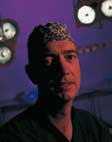 Stopping cancer in its tracks Two men, two cases of prostate cancer, two outcomes. The first is a 44-year-old whose prostate cancer was discovered during a routine physical. He underwent surgery to have the organ removed. Test showed no cancer in surrounding tissues, so he's probably cured. Nine times out of ten, men in his situation don't have a recurrence. His prostate cancer could well be a mere bump on the road to a long and healthy life. Our second gentleman was less fortunate. He too was diagnosed at a relatively young age - in his case, at 50. But by the time doctors learned of his condition, the disease had spread beyond the prostate gland into the bones. The prognosis for this kind of prostate cancer isn't good. Most men die within three years. True stories, with details smudged for confidentiality. Both of these men are patients of Dr. Christopher Evans, an assistant professor of urology at the UC Davis Medical Center. They're why he wants to find better ways to fight the most deadly varieties of this common male cancer. Prostate cancer is the most diagnosed malignancy in men. About one in eleven will develop the disease and about 3 percent will die from it - 40,000 American men this year alone. About the same number of women are expected to die from breast cancer. The enigma of prostate cancer, as with many neoplastic diseases, is why some prostate cancers are readily treated and why others are killers.
Home |
Table of Contents |
To our Readers |
Building on Basics UC Davis Health System | © 2000, 2001, 2002 UC Regents. All rights reserved. |
Keep prostate cancer from spreading and you keep it from killing. |

